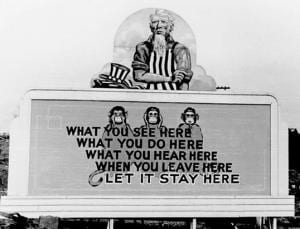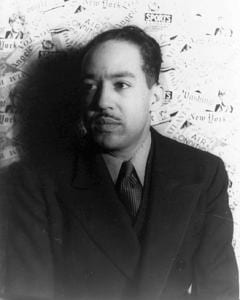 I was not very good at laundry and so I put bleach stains on my best shirt. They were light blotches, but I had a plan. Using a Sharpie, I colored in the blotches and the shirt was not at all as good as new, but passable for a time. There was always the Sharpie to try again.
I was not very good at laundry and so I put bleach stains on my best shirt. They were light blotches, but I had a plan. Using a Sharpie, I colored in the blotches and the shirt was not at all as good as new, but passable for a time. There was always the Sharpie to try again.
So the cultural memory of certain events can come out of the wash not quite as we would wish. They mostly are good, but our mistakes, our sins, create blotches. Some try to cover those up with historic Sharpies: covering up Soviet evils, downgrading the horror of the Holocaust, refusing even to remember the brutality of Chairman Mao.
We hope that something we have done as a species since we turned from the Divine will be all good with no stains. Nothing is, especially in the case of war. Killing other people is never wholly good, though certainly necessary. The passions unleashed rarely will be controlled and hate will motivate instead of a love of justice. War tempts us with moral shortcuts: “anything to win the war” has caused good men to do bad things.
Peace, naturally, can be just as ugly. The peace of the coward shuffling along content with injustice comes with blotches, stains, and mistakes. Yet peace and war are not quite the same: war is unnatural to humankind, peace natural. God created us to live in peace and the necessity of fighting is due to circumstances that should not have been. The pacifist peace, despite all the problems, is at least peace. The problem is not the state of peace, but the craven refusal to fight for more justice. War is not optimum by nature, peace by behavior.
There can be a perfect peace. In fact, one is coming when King Jesus returns. There can never be a perfect or utterly good “war.” This is true of even a justified war such as World War II. The war generally was just, but some ways the war was conducted by the Allies were unjust. We can celebrate the heroes of that war, the outcome, and concede the necessity, but we cannot love the War as war.
That is not the Christian way.
This distinction may seem fine, even tedious, but makes all the difference in the world. We are a religion for warriors, but not a religion of warriors. A Christian can fight, but with a sorrowful determination to do one’s duty. We always long for peace, since even accounting for all our failures of courage, peace is generally more noble than war. Often those who did not even fight in the war, the peacetime patriots, or the jingoists, glorify war. They even wish we would have a “good war” to unify the country.
This is like wishing for persecution.
God forbid.
We are willing to fight, but we never long to fight. We will honor the warrior’s courage, but never glory in the death. We cannot. The service of the teacher, the minister, the worker, and the creator are all noble callings. There can be heroism there, though not as noticeably.
Langston Hughes reminds us that even World War II can give us a false longing for “the good old days” of war. Those who were not there can forget the horrors of Iowa Jima or the traumas of prisoner of war camps:
World War II
What a grand time was the war!
Oh, my, my!
What a grand time was the war!
My, my, my!
In wartime we had fun,
Sorry that old war is done!
What a grand time was the war,
My, my!
Echo: Did Somebody Die?*
The thoughtful patriot pauses and hears the echo. Millions died. This is bad and must be known to be bad. We follow the Prince of Peace and so our celebration is for the end of the War and the justice brought. A traditional Christian rejects the simple minded approaches of the pacifist and jingoist. There are warfare metaphors in Scripture and Church history: we fight if we must. Most of the images of sacred history and tradition are of peace with justice.
Our best war is not great, our best peace better, but flawed.
We recognize that stains exist. We go forward, but with the knowledge they are there. Lord Jesus Christ, son of God, have mercy on us, sinners.
—————–
 *Hughes, Langston. Selected Poems of Langston Hughes (Vintage Classics) (p. 255). Knopf Doubleday Publishing Group. Kindle Edition.
*Hughes, Langston. Selected Poems of Langston Hughes (Vintage Classics) (p. 255). Knopf Doubleday Publishing Group. Kindle Edition.
Langston Hughes is my favorite American poet . . . since fifth grade! (This was one of the few things to come from that no-good year.) He always is worth reading. He challenges me, often disagrees with me, but frequently illuminates me. Thank God for such a poet.














